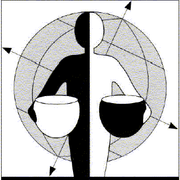-
It’s not just another phrase to tag on to organic, shade grown, dark roast, with cream, or no sugar. Fair Trade means ensuring that farmers in poor countries get a fair deal in the chaotic world marketplace that can so easily pass them over. It means guaranteeing farmers a fair price that covers the cost of production and provides a living income through long-term contracts that provide real business security. And it also means tasty coffee.
In conventional trading schemes, local speculators (called “coyotes”) take advantages of price fluctuations and farmers’ lack of access to market information, often paying farmers less than the market place. After the transaction takes place, the beans can go through a dizzying circuit of middlemen including exporters, brokers, roasters and distributors. In the fair trade model, roasters work directly with farming cooperatives to create sustainable contracts that often pay farmers100-200% more than conventional trading systems.
Fair Trade certification isn’t easy. The long list of regulations is often daunting for farmers, but they are quickly rewarded by the premium price that they receive for fair trade beans, and the assurance of a more secure, reliable market for their crop. Various Fair Trade Certification programs exist but all of them require fair prices, fair labor conditions, democratic and transparent organization, direct trade, environmental sustainability (no agrochemicals or GMOs) and community development projects like scholarship programs or quality improvement trainings. Additionally, Fair Trade systems often incorporate insurance programs to protect farmers from natural disasters that could devastate not only their crops, but also their livelihoods.
After extensive conversations with students, Carleton Dining Services decided to buy all Fair Trade coffee from the Vermont-based Green Mountain Coffee Roasters. Green Mountain was rated above the other contender, Starbucks, because of their stellar corporate social responsibility principles. The company’s stated purpose is to “create the ultimate coffee experience in every life [they] touch from tree to cup—transforming the way the world understands business.” They allocate 5% of their pre-tax profit to social and environmental causes and have extensive principles regarding coffee sourcing, community partnerships, environmental practices and the maintenance of a thriving workplace. At Carleton, Sodexho serves a variety Green Mountain’s organic, fair trade coffees, including many of their seasonal flavored varieties, even though they come at a significantly higher economic cost.
Continue by clicking the “read more” link below
